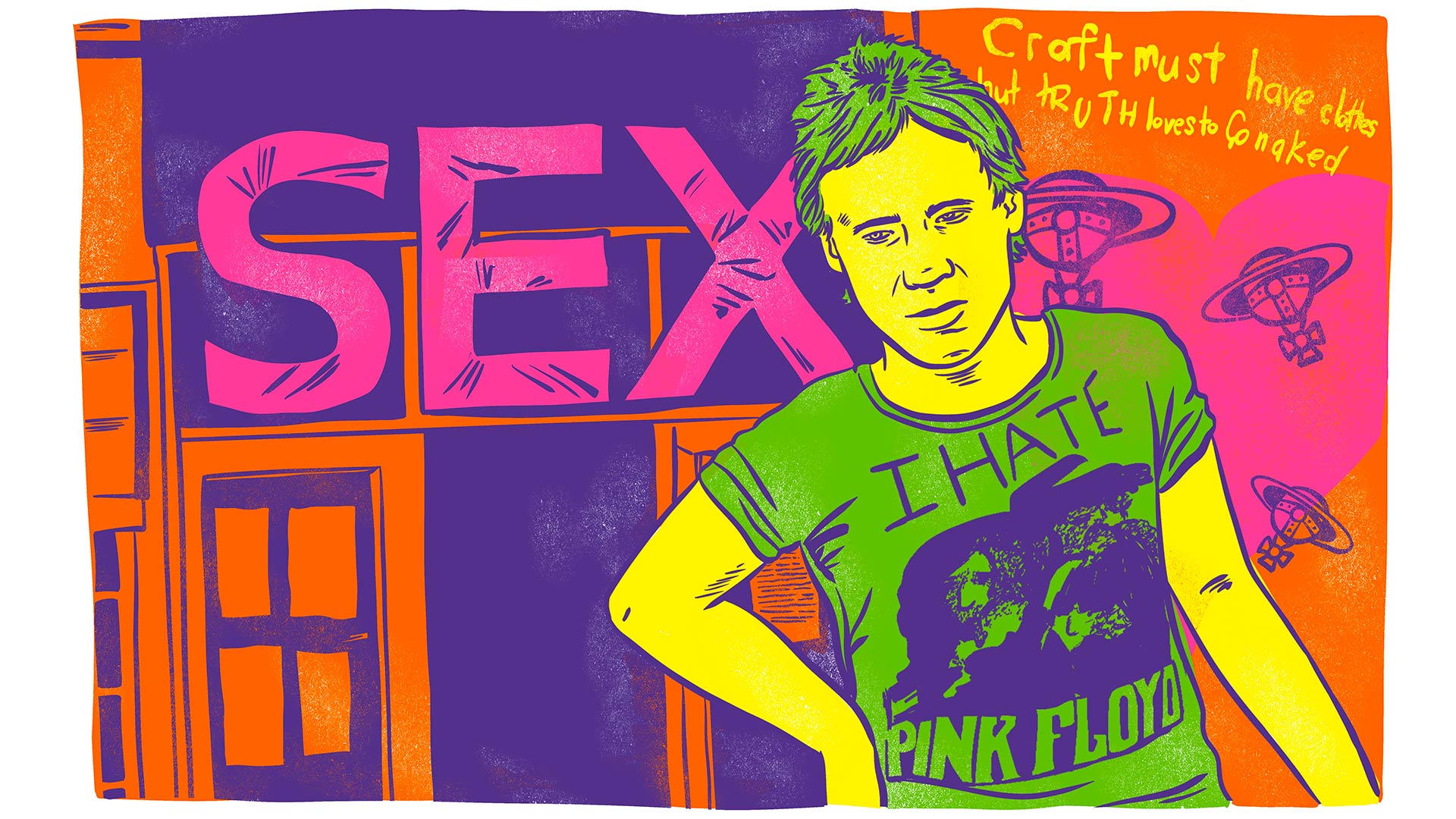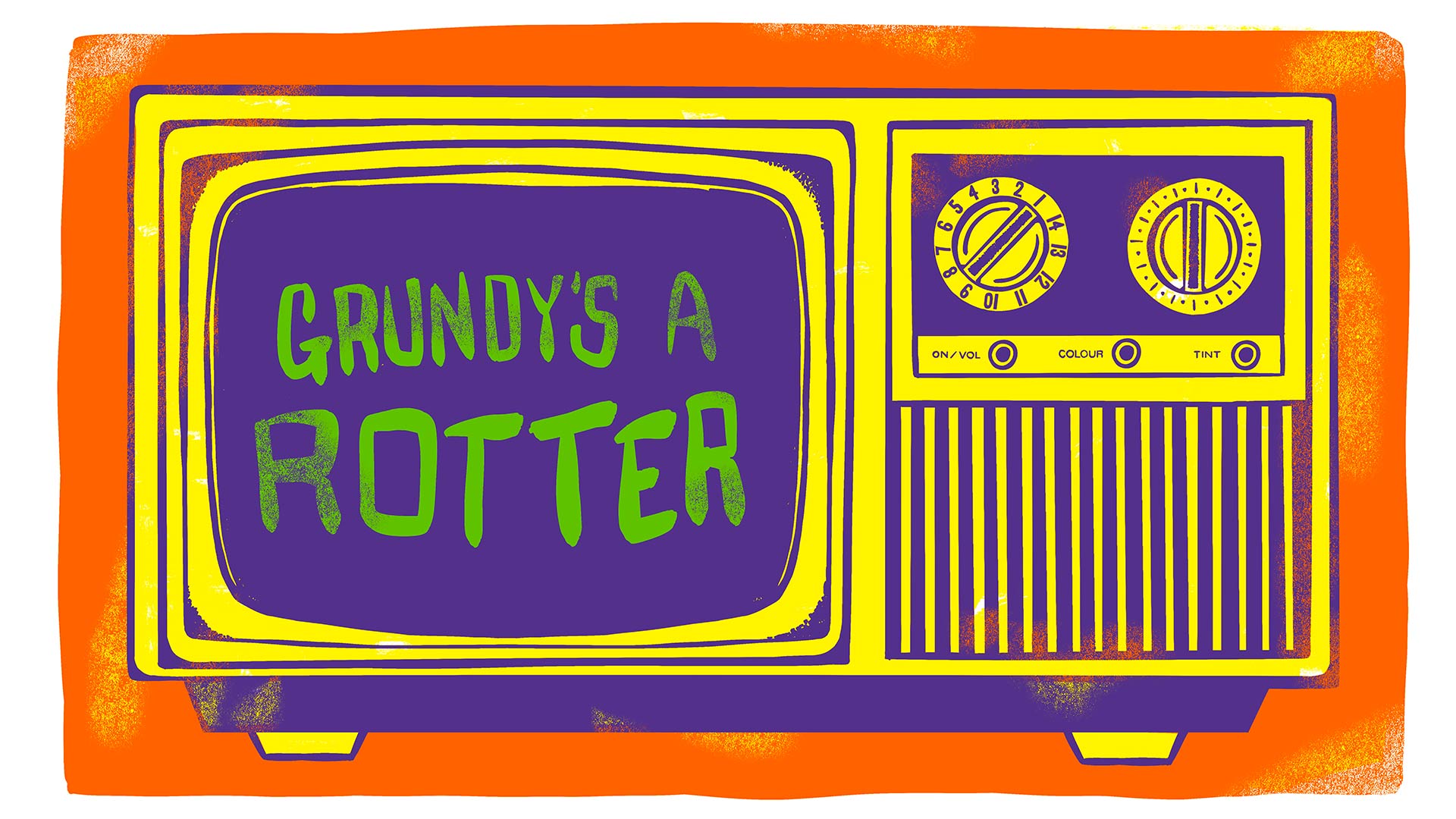To celebrate the new Star on Disney+ series, Pistol, we’ve created an illustrated history signposting six major events from the Sex Pistols’ career.
Pistol, the new limited series about UK punk rock trailblazers, Sex Pistols, streaming now on Disney+ under the Star banner. The six-episode series is directed by Danny Boyle (Trainspotting, Steve Jobs) and based on guitarist Steve Jones’ autobiography, Lonely Boy: Tales From a Sex Pistol.
Pistol demonstrates the enormous impact of the Sex Pistols’ nihilistic point of view and the band’s searing, reactive musicality. To get fans pogoing ahead of the show’s premiere, we’ve put together an illustrated history signposting six major events from the Sex Pistols’ career.
The Let It Rock Meeting

Illustration by Cass Stevens
Steve Jones, an illiterate truant and petty criminal, didn’t care much for conventional education. Jones and his friend, Paul Cook, made a habit of skipping school in the early 1970s, which eventually led to them forming a band. Jones was on vocals, Cook on drums and another friend, Wally Nightingale, on guitar. When Nightingale left, Jones—who’d already stolen plenty of guitars—decided to strap on a Gibson Les Paul and teach himself the basics. One rule: no Beatles chords.
They called themselves The Strand, then The Swankers, and frequently hung around Let It Rock, a West London clothing boutique run by Malcolm McLaren and Vivienne Westwood. Musician Glen Matlock had a job at Let It Rock—which later changed its name to SEX—and once Jones and Cook recruited him as their bass player, the foundations of the Sex Pistols were laid.
Johnny Rotten Hates Pink Floyd

Illustration by Cass Stevens
After McLaren agreed to manage Jones, Cook, and Matlock’s band, they were on the hunt for a front person. SEX was located on the King’s Road in London’s Chelsea district, which is where McLaren spotted an adolescent John Lydon in 1975. Lydon had a ragged appearance, with bleached hair and a homemade “I HATE Pink Floyd” T-shirt, and McLaren, who’d recently spent some time with the New York Dolls, brought him to meet Jones and the gang at SEX.
They conducted an impromptu audition—one that ostensibly involved Lydon singing over Alice Cooper on the jukebox—and Lydon was hired on the spot. Lydon’s poor dental hygiene soon gave rise to the nickname Johnny Rotten, and the original Sex Pistols lineup was complete.
The Manchester Lesser Free Trade Hall Gig

Illustration by Cass Stevens
Sex Pistols’ performance at Manchester’s Lesser Free Trade Hall in June 1976 was a watershed moment in UK rock music history. The Pistols’ debut single was still another six months away, but they’d already attracted national press attention—and, in turn, the attention of uni students, Howard Devoto and Pete Shelley, who’d later form the Buzzcocks.
Love Music?
Get your daily dose of everything happening in Australian/New Zealand music and globally.
Devoto and Shelley invited Jones, Cook, Matlock, and Rotten to come and play in Manchester. The resulting gig, at the 150-capacity Lesser Free Trade Hall, attracted roughly 35-40 payers, but the impact was immense. Along with Devoto and Shelley, the audience included Bernard Sumner and Ian Curtis, who immediately bought guitars and launched a nascent version of Joy Division; the 19-year-old Mark E Smith, who formed The Fall later that year; and Steven Patrick Morrissey, who’d ditch the first names and co-found The Smiths.
Filth and Fury on the ‘Today’ Show

Illustration by Cass Stevens
Sex Pistols released their debut single, “Anarchy In the UK”, in November 1976. The following week, the band’s EMI label mates, Queen, cancelled an appearance on ITV’s Today program, and the Pistols got the call-up.
“They’re punk rockers,” said Bill Grundy, host of Today. The 53-year-old Grundy unfavourably compared the band’s music to “Beethoven, Mozart, Bach, and Brahms,” which prompted Rotten to sneer, “Yes, they really turn us on.” “Well, suppose they turn other people on,” said Grundy, causing Rotten to mutter, “That’s just their tough shit.”
Grundy, who claimed to be drunk, turned his attention to the Pistols’ entourage, which included a pre-fame Siouxsie Sioux. “I always wanted to meet you,” said Sioux. “We’ll meet afterwards, shall we?” said Grundy. Jones was not impressed. “You dirty sod,” he said. “You dirty old man.”
Grundy, now rather bemused, said to Jones, “You’ve got another five seconds—say something outrageous.” Jones acquiesced: “You dirty bastard. You dirty fucker. What a fucking rotter,” he said. The next day, the Sex Pistols were front-page news all over the UK.
God Save Sid Vicious

Illustration by Cass Stevens
Glen Matlock co-wrote all but two tracks from the Pistols’ one and only album, Never Mind the Bollocks, Here’s the Sex Pistols, but concern about his punk rock bona fides led to his ousting in the early months of 1977.
Jones played most of the bass parts on Never Mind the Bollocks, but the Pistols’ second single, “God Save the Queen”, featured new recruit, Sid Vicious, who knew Rotten from college. What Vicious lacked in technical ability, he made up for in image and spirit—more so than any other Sex Pistol, Vicious has become a punk rock poster boy.
“God Save the Queen”—a sarcastic spin on the UK national anthem, featuring lines like, “She ain’t no human being”—came out on the eve of Queen Elizabeth II’s Silver Jubilee celebrations. The song was banned by the BBC but reached number two on the official UK singles chart.
“Ever get the feeling you’ve been cheated?”

Illustration by Cass Stevens
Before the Sex Pistol had even released a single, Jones told the press, “We’re not into music, we’re into chaos.” From “Anarchy In the UK” onwards, Sex Pistols’ noncompliant behaviour and proletarian politics sent shockwaves through the commercial music establishment. But by 1978, Sex Pistols were self-destructing, and fast.
The band’s final gig was at San Francisco’s Winterland Ballroom on January 14, 1978. It capped off a disastrous US tour—Vicious was now a full-blown heroin addict, Jones was picking fights with audience members, and Rotten was tired of being… well, Johnny Rotten.
The Winterland gig finished with a cover of the Stooges’ “No Fun,” after which Rotten blared, “Ever get the feeling you’ve been cheated?” And that was it for the Sex Pistols.



































